If you're a science fiction reader, then you know Dune. Since its publication in 1965, Frank Herbert's epic is considered by many to be the single greatest science fiction novel ever written. The novel has remained immensely popular among sci-fi enthusiasts, introducing readers to a complex interstellar feudal world and the relentless fight for “mélange”—a spice that extends life, helps in space navigation and grants new mental abilities.
Extremely multilayered, Dune and its many sequels grapple with important questions about religion, politics, ecology, technology, leadership and more, as we follow Paul Atreides through the seemingly inhospitable desert planet of Arrakis. Dune's characters are moving and complete, its plot is fascinating and powerful, and its world is among the most unique and fully realized in the history of speculative fiction.
Denis Villeneuve’s two-part adaptation of Frank Herbert’s Dune doesn't hurt its popularity, either. The critically acclaimed and commercially successful adaptations starring Timothee Chalamet, Zendaya, Oscar Issac and others, have transported a whole new generation of fans to Arrakis. MAX has expanded the universe with its new show, Dune: Prophecy, which revolves around the origins of the Bene Gesserit.
Reading or watching Dune for the first time will make you wish that you could erase your memory and start over, just so you could experience it all again for the first time.
You can't do that, of course (sorry). And while Dune's many sequels and spin-offs give fans plenty more to check out after they finish the original masterpiece, none of those can match the original experience. With that in mind, we went digging through our bookshelves looking for Dune-like stories that Dune fans may not have read yet.
So, if you’re keen to journey to more alien planets rife with strange fauna and political intrigue, add these titles to your TBR pile.
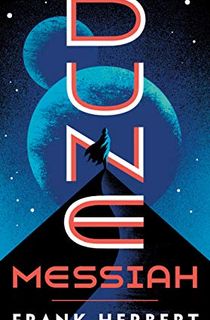
Dune Messiah
If the concluding events of Dune: Part Two had you going WTF, you’re not alone. Rather than wait for Villeneuve to make another adaption, you can simply read Dune Messiah by Frank Herbert, the second of six total Dune novels. This one deals with Paul Atreides’s not-so-successful reign as Emperor, as many factions (including the Bene Gesserit) conspire to undermine him.
Moreover, we learn that Chani didn’t give birth to a daughter, but to preternatural twins who have full access to their ancestral memories. If Paul and Chani’s emotional journey was your favorite part about Dune, Dune Messiah is a thrilling follow-up that focuses on the next and final chapter of their lives.
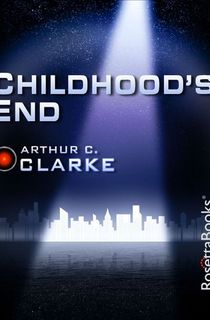
Childhood's End
British novelist Arthur C. Clarke is one of science fiction's all-time great writers, and Childhood's End is one of his most thought-provoking works. Set after an alien invasion, Childhood's End examines mankind in submission. Ruled by a more powerful alien race, mankind benefits in some ways and suffers in others. Clarke's view of power imbalances and interstellar colonialism should be of interest to Dune fans, though Childhood's End is in some ways very different from Frank Herbert's masterpiece.
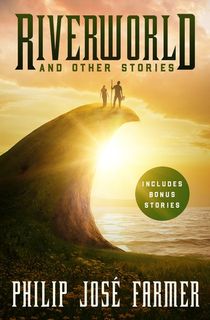
Riverworld and Other Stories
The fictional planet of Riverworld is arguably Philip José Farmer's greatest creation. Riverworld is a large terraformed planet dominated by a river valley that snakes all over its surface. It is home to humans who have been artificially resurrected for some unknown purpose. Farmer's use of sexual and religious themes, along with his strange and carefully constructed setting, will intrigue fans of Dune.
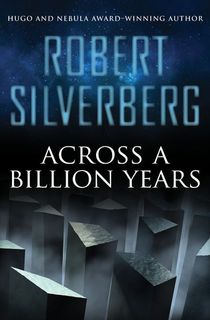
Across a Billion Years
Graduate student Tom Rice is thrilled to embark on his first deep-space archeological expedition. His team of space archaeologists are sent into the darkest realms, millions of miles from Earth, in search of artifacts from an extinct civilization that ruled the universe many millennia ago. The High Ones left clues about their history and culture scattered throughout space, including a message with footage of themselves that hints at something unexpected: what if the High Ones didn't die off?
Tom and his crew then embark on an intergalactic hunt for further proof of the High Ones and answers over their disappearance. What they discover could change the face of the universe itself.

This Is How You Lose the Time War
If reading or watching Dune made you long for star-crossed lovers caught in the crossfire of history’s bloody battles and stories told over multiple timelines and generations, you will adore this epistolary novel by This is How You Lose the Time War by Amal El-Mohtar and Max Gladstone.
It narrates the story of two secret agents—Red and Blue—who are on opposing sides of a war, risking everything for love, leaving secret letters for each other across time and space. Poignant and poetic, this sci-fi novella is an excellent addition to the corpus of timey-wimey love stories.
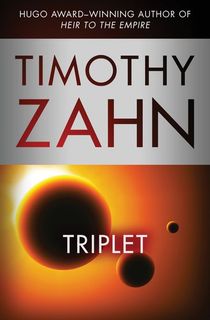
Triplet
For science fiction fans, Timothy Zahn needs no introduction. Zahn is one of the greatest to ever write in the genre, and while he didn’t write Dune, Zahn has written a few all-time classic science fiction novels of his own. Among them is Triplet, in which Zahn creates a planetary system as vividly imagined as the Dune universe. The Triplet system comprises battle-scarred planets that are connected by portals and full of mysterious and primal magic. Readers explore Triplet along with a researcher, giving Zahn's novel an anthropological feel that suits the world-building.

Jaran
Kate Elliott's Jaran imagines an interstellar future in which a massive political power, the Chapalii empire, governs conquered planets — including Earth. Protagonist Tess Soerensen, a native of Earth, leaves home for the planet Rhui. There, she meets the Jaran, natives of Rhui who live as nomads and are ruled by none other than Soerensen’s own brother. Like Frank Herbert’s Dune, Elliott’s Jaran wrestles with ideas of colonialism and imbalances of political and military power.
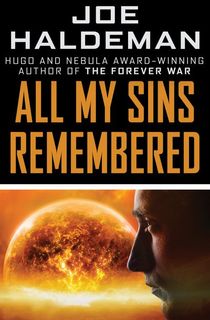
All My Sins Remembered
Once, Otto McGavin was a kind and gentle soul with no enemies. But then he was recruited by the all-powerful Confederación. An ultra-secretive, government-linked organization, the Confederación’s stated mission is to protect life, alien and human, from threats throughout the galaxy.
At first, Otto is eager to be a force for good, a diplomat to the stars. But his new masters have other plans for the idealistic young recruit. Through a process of immersion therapy and hypnosis, Otto's kind soul has been transformed into a ruthless, cold blooded killer, ready to do whatever the Confederación wants him to be.
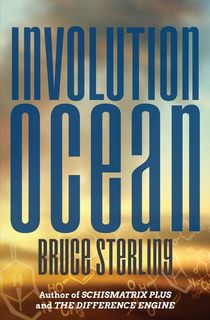
Involution Ocean
Bruce Sterling's Involution Ocean reads like a speculative fiction version of Moby Dick. Sterling's protagonist is hooked on a powerful drug derived from the whale-like creatures native to the deep sea of the planet Nullaqua. He joins up with a whaling ship in the hopes of getting his next fix. Involution Ocean's vividly imagined world, with its crucial commodity and native megafauna, is reminiscent of Arrakis in Frank Herbert's Dune.

Red Mars
If you were fascinated by the efforts of the Fremen who over multiple generations sought to transform the desert planet of Arrakis into a lush green paradise, you might be interested in Kim Stanley Robinson’s Mars trilogy. Published in the 90s, these books deal with the project of terraforming Mars over two centuries.
Riddled with sandstorms, Mars is a pretty inhospitable planet, until a group of 100 colonists arrive there in 2026 with an ambitious plan to transform the planet forever, even as Earth is ravaged by ecological disaster and economic ruin. Ambitious and ingenious, Red Mars is a groundbreaking work by a visionary writer.

The Jesus Incident
Frank Herbert is best known for Dune and other classic novels set in the same universe. But the somewhat lesser-known novels that Herbert set in his Destination: Void universe are well worth reading if you're a fan of Herbert's writing. Herbert's 1979 novel The Jesus Incident is the second novel set in the Destination: Void universe (after the eponymous Destination: Void, published in 1965), though its plot ties it more closely to its two sequels, The Lazarus Effect (1983) and The Ascension Factor (1988). Readers can skip Destination: Void and read The Jesus Incident and its two sequels as a trilogy if they so choose. Like Dune, Herbert’s The Jesus Incident is concerned with post-Earth mankind and colonial ambitions. The novel alternates narratives, covering settlers on the ocean planet of Pandora as well as characters aboard an orbiting ship, where the shipboard AI has become sentient.
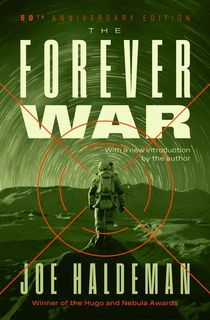
The Forever War
If the Holy War in Dune piqued your attention, you might also want to check out The Forever War, a military science fiction novel by Joe Halderman where humans are embroiled in an interstellar war against the Taurans, a fierce alien civilization. Regarded as a classic, this contemplative novel draws on the author’s own experience as a Vietnam War veteran and promises to be an unforgettable read.

Foundation
Like Dune, Asimov's Foundation is widely considered to be one of the greatest science fiction novels of all time. The parallels don't end there, though: Both novels are set in distant futures and envision mankind far removed from its Earth-bound past. Both consider the role of prophecy, and both create convincing worlds rich enough to host plenty of sequel and prequel works.
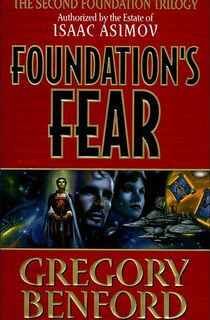
Foundation's Fear
Based on Issac Asimov’s influential Foundation series, Gregory Benford’s Foundation's Fear is an ambitious novel that tackles a declining Galactic Empire, advanced mathematics and psychohistory. While familiar Asimov characters such as Hari Seldon get the center stage, Benford departs from some of Asimov’s concepts and replaces them with his own. Compelling and thoughtful, Foundation’s Fear is a good fit for hard sci-fi enthusiasts.

Speaker for the Dead
Orson Scott Card's Ender's Game is one of the greatest science fiction novels ever written, but the story doesn't end there — and fans of Dune might prefer the sequel to Ender's Game, 1986’s Speaker for the Dead, over the original. Speaker for the Dead witnesses an older Ender on a foreign planet, where human colonists and a native alien species struggle to understand each other—with sometimes violent results.

Hyperion
Sci-fi stalwart Dan Simmons won the Hugo Award for the first book in his Hyperion Cantos series. In the year 2732, the Hegemony of Man controls hundreds of planets, interconnected by portals that offer instant travel between locations. The planet Hyperion is outside of their control, and it is to there that the Catholic priest Paul Duré is exiled. On this strange land, structures known as Time Tombs lie, which are are moving backwards in time and guarded by a legendary creature known as the Shrike. Some worship him as a god. Others seek to kill him. The universe is on the verge of Armageddon, and releasing the Shrike from Hyperion could lead to the destruction of humanity.
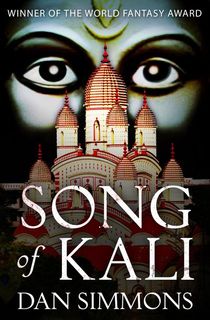
Song of Kali
If you're in the mood for more Dan Simmons, you can't go wrong with Song of Kali.
Dune with its sandworms and hostile deserts, of course, has its moments of sheer terror. If you’re up for more moments of bone-chilling terror, you should give the World Fantasy Award-winning novel set in the dark underbelly of 1970s Calcutta. The novel follows an American family in search of a long-lost manuscript that has eerie connections to the blood sacrifices performed by an ancient cult. Bizaare, alien and utterly grisly, this novel is sure to appeal to horror aficionados.

The Principle of Moments
An enthralling space fantasy debut by Esmie Jikiemi-Pearson, The Principle of Moments is a fun and invigorating read for fans of Dune. Straddling a Regency-era time travel romance with a rescue mission unfolding in the 60th century, the novel is one hell of a rollercoaster ride. And for those deeply missing Arrakis, this book also has a desert planet called Gahraan, where humans work as indentured laborers under the tyrannical rule of Emperor Thracin.

Ancillary Justice
Ancillary Justice by Ann Leckie is gloriously weird, inventive, and wholly unlike anything you’ve read before. The first title in her Imperial Radch trilogy, Ancillary Justice follows the escapades of Breq in her quest for revenge. She’s an “ancillary”—referring to a human body enslaved to an artificial intelligence of a starship.
Once upon a time, Breq was actually the Justice of Toren, a ginormous starship with an artificial intelligence connected to thousands of soldiers—until a terrible treachery separated her from the mothership, leaving her with a fragile human body and a burning desire for answers … and revenge.

Lord of Light
The political intrigue of Dune is a big part of the reason that the book and its sequels have stood the test of time. Zelazny's Lord of Light is a great choice for fans of politics in science fiction plots. Like Dune, Lord of Light envisions a post-Earth future for mankind and has a great interest in colonialism and spirituality. The bad news: Unlike Dune, Zelazny’s Lord of Light has no sequels, prequels, or spin-offs to turn to after the last page.

The Three-Body Problem
Cixin Liu’s Remembrance of Earth’s Past trilogy became a pioneer of modern Chinese sci-fi for many Western readers after it unexpectedly won the Hugo Award, and now it’s being adapted into a big-budget series for Netflix. Set against the backdrop of China's Cultural Revolution, a secret military project sends signals into space to establish contact with aliens. The hope is to make first contact with extra-terrestrials in the name of peace and advancement.
But one alien civilization on the brink of destruction captures the signal and decides to invade Earth. With this unprecedented threat on the horizon, the planet divides into various factions, some eager to welcome the aliens and others training to fight against them.

Consider Phlebas
The late great Scottish author Iain Banks wrote a wildly unique sci-fi epic over the course of 25 years. His 10-book saga focuses on The Culture, a utopian space society of humanoid aliens and hyper-advanced AI spread across the Milky Way. The Culture is at war with the Idiran Empire, who view their society as warped and doomed to fail.
Consider Phlebas, the first novel in the series, follows Bora Horza Gobuchul, a shape-changing mercenary who has been tasked by the Idirans to infiltrate the Culture at any cost.

The Many-Colored Land
In the year 2034, Theo Guderian, a French physicist, discovered a route through time that led all the way back six million years. Soon, many scientists and adventurers are leaping back into the prehistoric era. In 2110, a strange and group of people, including a priest, a palaeontologist, and a starship captain, was preparing to make the journey from 2110 to the Pliocene era.
But this time, the journey has some unforeseen complications. Far from being uninhabited, Pliocene Europe is the home of two warring races from another planet, and the humans are now in the middle of it.
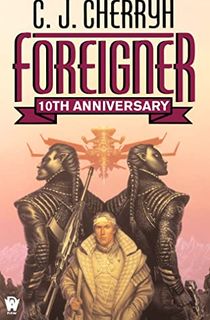
Foreigner: 10th Anniversary Edition (Foreigner series Book 1)
If you want your sci-fi epic to be truly epic in terms of page count, there may be no greater example than the Foreigner series by C.J. Cherryh, which is more than 20 books long (plus several short stories!)
En route to build a new space station, the Phoenix suffers a malfunction and ends up lost in space. Emerging from the chaos of faster-than-light travel, the ship crash lands on a planet inhabited by ferocious black-skinned aliens known as the Atevi. So begins humanity's first contact with a new species, and a centuries' long saga of development on a new planet where relations with the locals are, to put it mildly, complicated.
Bren Cameron, a human who has been appointed an interpreter by his people, becomes a diplomat of sorts between the species. When an assassination attempt is made on his life, Bren is forced to confront the stark differences between humans and Atevi, and find peace before it's too late.














